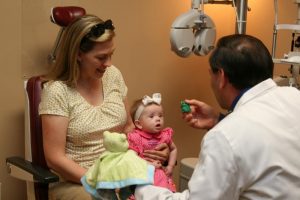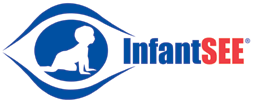“The American Optometric Association guidelines recommend that all children have a complete vision and eye health examination at the age of 6 months, 3 years, upon entering kindergarten, and routine vision care (every 2 years) thereafter throughout their school years.” (http://www.aoa.org)
What Is Special about Children’s Vision?
 Many vision problems can be corrected more easily with early diagnosis and treatment. Reports have estimated that up to 25% of students in grades K – 6 have vision-related problems, which may contribute to poor school performance. The visual system matures rapidly during the first few years and it is important to identify any problems that may interfere with normal vision development.
Many vision problems can be corrected more easily with early diagnosis and treatment. Reports have estimated that up to 25% of students in grades K – 6 have vision-related problems, which may contribute to poor school performance. The visual system matures rapidly during the first few years and it is important to identify any problems that may interfere with normal vision development.
Vision, in the broadest sense, is the global ability of the brain to extract, process and act on information presented to the eye. This complex process can be thought of as three major but related areas: visual acuity, which is largely dependent upon refractive status and eye health; visual efficiency skills, representing eye focusing, teaming, and tracking skills; and visual information processing, representing the ability to recognize and discriminate visual stimuli and to interpret them correctly based upon previous experience. All of these are considered during our examination of children.
Hand – Eye Coordination
 As part of the visual examination, we also assess vision development. Young children use vision to explore the world by identifying and directing movement. If a problem in vision is preventing adequate development of perception and eye-hand coordination skills then early intervention is vital.
As part of the visual examination, we also assess vision development. Young children use vision to explore the world by identifying and directing movement. If a problem in vision is preventing adequate development of perception and eye-hand coordination skills then early intervention is vital.
Infants
 Eye & Vision examinations should begin prior to a baby’s first birthday and continue through the school years. Although babies & younger children may not be able to read an eye chart, we use special test procedures which allow us to measure the visual acuity of children at almost any age.
Eye & Vision examinations should begin prior to a baby’s first birthday and continue through the school years. Although babies & younger children may not be able to read an eye chart, we use special test procedures which allow us to measure the visual acuity of children at almost any age.
Dr. Janot is a provider for the InfantSEE program, a nationwide effort of volunteer optometrists who provide no cost eye exams to babies between 6-12 months of age. Click on the InfantSEE logo here to learn more or call our office at 625-2020 to schedule your baby’s InfantSee exam!
Eye Exams for Toddlers & School-aged Children
A comprehensive eye examination will assess visual acuity, refractive status, ocular health, eye tracking, eye focusing, and eye teaming. Visual acuity measures how clearly a child sees objects. Refractive status measures for nearsightedness (myopia), farsightedness (hyperopia), and astigmatism. The child is evaluated for any eye health problems, including active pathology or congenital anomalies. Eye tracking is the ability of the eyes to fixate, smoothly follow and look between objects or printed words. Eye focusing is the ability to efficiently change and sustain focus while reading. Eye teaming is the ability to coordinate both eyes accurately and without fatigue or excessive effort. Accurate eye teaming is also important for accurate two-eyed depth perception or stereopsis. Early detection and management is recommended to prevent vision loss or eye disease and to provide appropriate vision development.
